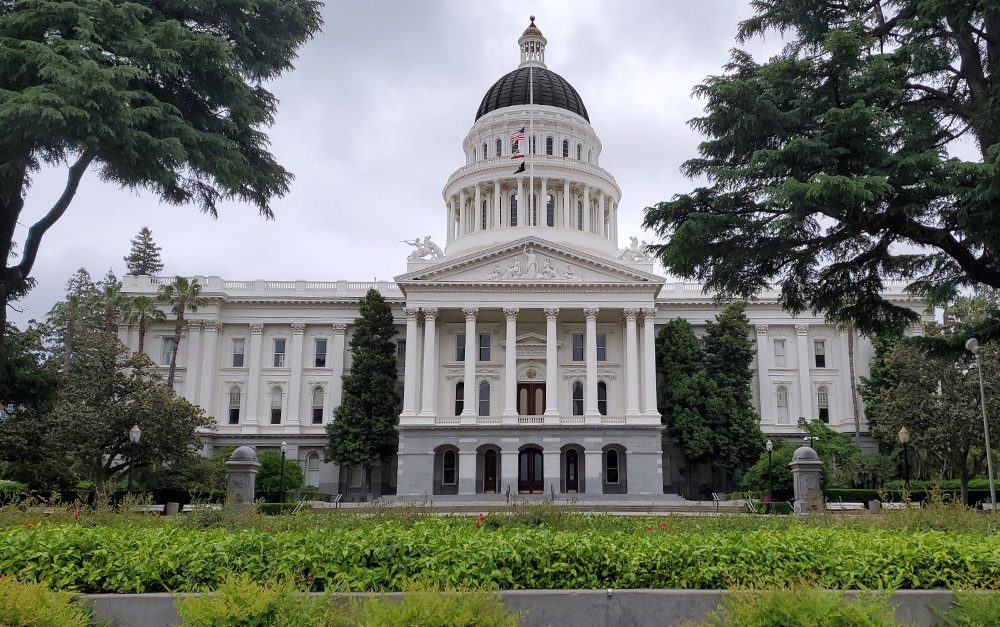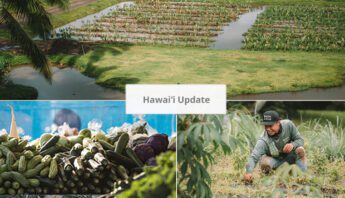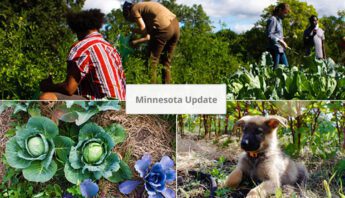You’ve probably been hearing plenty from PAN lately about some high profile national work we’re involved in – maybe you’ve asked your Senator to support the Protect America’s Children from Toxic Pesticides Act (PACTPA)? Or perhaps you’ve checked out our priorities for the next Farm Bill, which call for federal food and farm policies that works for farmers, workers and communities.
However, unless you live in one of the states in which PAN has an on-the-ground organizing presence, (Minnesota, California, and Hawai‘i) you might not know about the exciting state-level legislative work we’ve been doing with partners across the country. So, let us fill you in! Even if you don’t live in these states, policies enacted in one location can be used as models or resources for other communities – we hope you’ll be inspired.
Local control and land access in Minnesota
Organizing Co-Director Zoe Hollomon has been hard at work in Minnesota, taking advantage of an exciting new dynamic in the state legislature – almost one third of members are new, which gives us the opportunity for positive changes! There’s a flurry of activity in the state to reframe how Minnesota supports restorative food and agriculture.
In partnership with our pollinator coalition, PAN is championing several exciting initiatives that would:
- Give local control to municipalities to make decisions about what pesticides are used in their neighborhoods;
- Prohibit harmful and unnecessary lawn and garden uses of neonicotinoid pesticides;
- Develop a regulatory program for treated seeds;
- Prohibit uses of systemic insecticides and seed treatments on Department of Natural Resources-managed land;
- Sustain the successful Lawns to Legumes Program;
- Fund a general pollinator account;
- Create and maintain habitat along state highways; and
- Prohibit PFAS, or “forever chemicals” in pesticide formulations.
We’re also working toward equity in land access. PAN, the Midwest Farmers of Color Collective, and Land Stewardship Project are collaborating to advocate for funding for the Down Payment Assistance Grants Bill. This bill would assist first-time buyers and emerging and BIPOC farmers in accessing land, a critical first step in creating equity for farming and land stewardship. Zoe has been doing advocacy work at the capitol with a group of farmers, meeting with bill author House Rep. and Ag Committee Chair, Samantha Vang.
Environmental justice and resilient food systems in California
Following the 2022 election, about one third of state legislators this year in California are new! This is an important moment to build relationships with policymakers and cultivate new champions for health and justice in the state’s food and farming systems – a priority for Organizing Co-Director Asha Sharma. One of these champions is Assemblymember Alex Lee, who we’ve partnered with for bill AB 652. This bill would establish an Environmental Justice Advisory Committee at the Department of Pesticide Regulation (DPR) to create transparency and more accountability to the communities most impacted by pesticide exposure.
After decades of trying to work with DPR to promote common sense pesticide regulations, we’ve witnessed a pro-industry culture that too frequently ignores community concerns – especially from those who are most impacted by the health effects of pesticide exposure, such as farmworkers. The revolving door between DPR leadership and the chemical and agricultural industry is a huge problem. Many past DPR directors and deputy directors have accepted jobs with Big Ag after leaving their agency roles – the last director is now employed by pesticide giant Syngenta.
The Environmental Justice Advisory Committee would provide recommendations on how DPR can integrate environmental justice into its decision-making, and DPR would be required to report on how they’re implementing the committee’s recommendations. We’re happy to report the bill sailed through its first committee hearing, where farmworkers from Tulare County came out in full force with their support!
PAN is also supporting AB 408, a bill that would place a bond measure on the November 2024 ballot. If passed by voters, $3.4 billion would be invested in sustainable agriculture; farmworker well-being; healthy, sustainable food access; and regional food infrastructures. The bill has passed through two committees so far and will be heard in the appropriations committee later this Spring!
Protections from Restricted Use Pesticides in Hawai‘i
Hawai‘i’s 2023 legislative session is coming to a close, and this year PAN and partners have been focused on several bills related to Restricted Use Pesticides (RUPs). This work started back in January when the Protect Our Keiki Coalition – of which PAN is a member – co-hosted a meeting on the island of Oahu with State House Representative Perruso. Approximately 50 community members attended, and discussion focused on RUPs on central and north Oahu.
Recent data shows that central Oahu suffers from the heaviest application rates of these chemicals in all of Hawai‘i. Over 215,000 pounds of RUPs were applied in this region during 2019 alone, approximately 60% of RUPs applied in Hawai‘i during this time period. The bills we’ve been championing aim to address this issue and protect Hawai‘i’s keiki (children), communities, and land by:
- seeking to reclassify neonicotinoid pesticides as Restricted Use Pesticides;
- establishing a half-mile buffer zone around schools and public parks, to ensure chemical drift isn’t impacting public health or sensitive natural areas; and
- improving reporting requirements for Restricted Use Pesticides by including geo-spatial data and monthly reports.
Our work in Hawai‘i is rooted in community-building, and collaborating with those most at risk of pesticide exposure by supporting them and amplifying their voices. Organizing Co-Director Lorilani Keohokalole has been hard at work with our partners at the Hawai‘i Alliance for Progressive Action (HAPA) to offer opportunities to take action and share testimony in support of these bills.
Despite this work, these bills weren’t scheduled for a hearing. We are deeply disappointed that lawmakers did not prioritize these common sense public health protections, but our advocacy for clean land, air, water, and healthy communities in Hawai‘i continues year-round – and we’ll be ready for next session.
What’s happening in your state?
Despite what happens with each of these bills at the close of state legislative sessions, the organizing and advocacy involved in the entire process is inherently valuable. We’re building relationships with policymakers, forming alliances with partner organizations, and raising awareness on the public stage around the issues we believe are important. Bills that may have stalled one year are often reintroduced with renewed support the next year. Or, measures that don’t make it through the legislature may move over for regulatory action instead.
And statehouses have power! Maryland just took a crucial step toward banning PFAS in pesticides by passing a bill requiring clarification on how to best test pesticides for PFAS. In 2018, Hawai‘i became the first state to ban use of the brain-harming pesticide chlorpyrifos, setting the stage for several other states like California and New York to follow before we finally saw national action on the pesticide. So, even if you don’t live in Minnesota, California, or Hawai‘i, perhaps something you read here could inspire action in your own neck of the woods.






